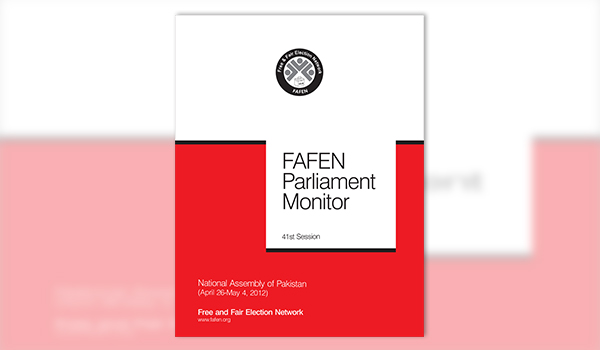The first session of the fifth parliamentary year traditionally convened to discuss the President’s address to the joint session of the parliament was marred by opposition’s protests and walkouts over the Prime Minister’s conviction by the Supreme Court in the contempt case. This badly disrupted the normal proceedings as 76% agenda items appearing on the Orders of the Day were not taken up. Apart from not debating the President’s address, the House also deferred discussion on the tragic Bhoja Airlines crash on the outskirts of Islamabad that killed all 127 people on board.
The 41st session from April 25 to May 4 met for a total of 10 hours, on average each sitting lasting an hour and 16 minutes. The trend of sittings starting late continued with each being delayed on average by 82 minutes. The main opposition party PMLN staged protests and boycotts throughout the seven sittings demanding the Prime Minister’s resignation.
However, amid the PMLN protests, the House passed a government Bill to set up a nine-Member National Commission for Human Rights. The Bill has already been passed by the Senate. Six out of 14 Private Member Bills were introduced and sent to the respective Standing Committees.
As the PMLN was busy protesting loudly during the sixth sitting, the House adopted two treasury-backed Resolutions.
This was the first time during the tenure of the 13th National Assembly that a Resolution was adopted without consensus. Previously, all pieces of legislation or Resolutions have been passed unanimously, including the 18th, 19th and 20th Constitutional Amendments, with political consensus among parliamentary parties.
Renewing debate on creating new provinces, the first Resolution called upon the Punjab Assembly to “present a Bill…to amend the Constitution in accordance with Article 239(4) of the Constitution for passage which would have the effect of altering the limits of province of the Punjab, thereby creating Province of Janoobi Punjab.”
Hitting back at the opposition protest, the other Resolution reposed confidence in the Premier as the “constitutionally and democratically elected Prime Minister and unanimously elected Chief Executive of this country.”
Overall 28% of the Members – 66 male and 30 female – participated in the session by submitting agenda items on the Orders of the Day or by taking part in debates. The male parliamentarians appeared to be less active than their female counterparts. Their participation remained 25% of their total membership of 263 while female participation was 38% of their total membership of 78.
A party-wise analysis shows that 68% of the MQM parliamentarians took part in the proceedings. They were followed by MMAP’s 50%, PMLN’s 42%, PPPP’s 22%, ANP’s 21%, and PML’s 6%. As the National Assembly does not make the attendance records of their Members public, FAFEN conducts a headcount at the beginning and end of each sitting.
However, despite protests and boycotts the legislators’ attendance remained satisfactory. On average, 111 parliamentarians were present at the beginning and 141 at the end of each sitting.
In the immediate aftermath of the contempt case, the government, its allies and the PMLN made sure their legislators were present in the House. But on the other hand the Prime Minister, who has attended most sittings throughout the last four years, was absent from all but two sittings during the 41st session mainly because of the PMLN protest over his conviction in the contempt case.
The Speaker presided over 67% of the session time, while the Deputy Speaker for 33% of the time. The Leader of the Opposition was present in four sittings but refrained from participating in the protests staged by his party.
The parliamentary leaders of ANP, PMLF and MMAP did not attend the entire session, while the leader of NPP attended six sittings, PPPS (four), PML and MQM (three each) and BNPA (two).
The Chief Whips ensure presence and discipline of fellow party legislators in the House. The PPPP’s Chief Whip performed his duties in all sittings, followed by PMLN and MQM (six each), PML, ANP and MMAP (five each), NPP (four) and BNPA and PPPS (one each).
A total of 308 questions appeared on the Orders of the Day – 138 Starred (requiring oral replies) and 170 Unstarred (requiring written replies). One-sixth (24 out of 118) Starred questions were taken up. Around 63% questions were directed to the Cabinet Secretariat (47), followed by the Ministry of Finance and Revenue (46), Interior (45), Communication (20), Water and Power (19) and Petroleum and Natural Resources (18).
None of the four Calling Attention Notices moved by eight male and eight female legislators were taken up by the House. These notices were about “failure to execute the Thar coal power generation project due to lack of funds”, “nonobservance of safety measures by the Civil Aviation Authority (CAA) resulting in crash of aircraft of Bhoja Airlines”, “beleaguered state of machine tool factory Karachi” and “burning of the Holy Quran by an American pastor in Florida”.
During the session, Members used the opportunity to deliver long speeches on Points of Order on matters relating to their constituencies or other issues. Twenty-eight Points of Order consumed 36% (215 minutes) of the total session time.
The opposition benches mostly talked about the performance of the federal government besides demanding the Prime Minister’s resignation, while the treasury took the floor mostly to respond to criticism. None of the Points of Order attracted the Chair’s formal ruling, without which these Points of Order do not lead to any output.
For complete report click here









